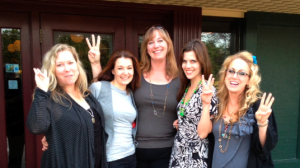Writing Craft for Lone Wolves and
Authors on a Budget
By Piper Bayard
Sshh! I have a secret. I’ve never said it out loud, but I’m going to share it with you – because you need to know.
I’m an author with two books out. Both books made the top ten of one bestseller list or another. I also post at over 60 websites nationwide that reach four million Twitter followers, give or take a few. Some people would say I’m doing okay. Some of those people will never look at me the same way after they know this about me . . .
*deep breath*
I have never taken a creative writing class, I have never read a book on creative writing, and I neither have nor want a critique group.
*exhales*
Are you still with me?
Here’s another secret. I’m not the only one.
Some of us writers shut down when we have too many voices in our heads, and we have to be very picky about who we allow into our creative process. Some of us must fight off the compulsion to write with perfection, and we know that if we ever stray into the Tide Pool of Over-Analysis, we will never find our way back to the Ocean of Get it Done and Move On. Some of us give too much weight to the opinions of others when we should be listening only to select professionals and ourselves. And some of us become addicted to the weekly strokes of a loving critique group that has never published a novel between them, choosing the short-term ego gratification over the desolate wasteland of years of trampled self-esteem in exchange for crumbs of opportunity. Some of us need to run as lone wolves if we are to run at all.
But here’s another, more practical reason some of us writers avoid writing classes and books . . . THEY ARE FLAMING EXPENSIVE!
Let’s face it – we’re writers. That means we are probably working some other day job, or someone in our lives loves us enough to feed us while we play with our imaginary friends. Most of us aren’t rich (yet), but even we lone wolves need to nurture our craft.
Here’s good news! We can do that and become excellent authors without paying through the nose. This is how . . .
Write.
Do it now. Some writers want to wait until they “know how” to write. That’s like waiting until we know how to walk before we stand up and move. Every art, every career, has an apprenticeship. For writers, that’s our first million words, so the earlier we start, the better.
“But I suck! I need to learn what I’m doing.”
Of course, you do. We all do. Even if our final product doesn’t suck anymore, at some point in every WIP every writer, even NYT bestsellers, looks at the page and says, “This sucks!” But the act of writing is an indispensible component of learning to write well. Maureen Johnson says it best.
Blog.
Yes, blog, especially if your novels have not yet been published. Blogging is like lifting at the gym to build writing muscles, and it has multiple benefits, particularly for newer writers.
- Blogging counts toward the million-word apprenticeship.
- It fosters good work habits by requiring us to meet weekly deadlines for polished product.
- It teaches us to organize and condense our thoughts and eliminate excess words.
- It gives us a mostly safe space to get the worst of our sucking out of the way. (See above.)
- It fosters a professional writer attitude because we ARE writing, and we have a product to show for ourselves. When people ask if we are published, we can give them a business card with a website and articles they can read. When we take ourselves more seriously, so does the rest of the world.
Locate online writing jedis and follow their advice.
Writers are generous people, and there are some brilliant writers and editors who are gracious with their knowledge and experience. Find a FEW of them who resonate with you, and read their posts regularly. Don’t read too many, or you’ll get caught up reading all day instead of writing. (See above.)
A good way to locate writing instruction that resonates with you is to check out the Writer’s Digest 100 Best Websites for Writers. These are a few of my personal favorites that have helped me the most over the years:
- Writers In The Storm — A Blog on Writing
- Kristen Lamb’s Blog
- Angela Ackerman — Writers Helping Writers
- Jami Gold’s Blog
- Marcy Kennedy’s Blog
I also highly recommend following Hiro Hattori mystery author and publishing attorney Susan Spann’s #PubLaw series every Wednesday at noon Pacific on Twitter.
Befriend authors on social media.
All writers need friends. All writers have questions. Friends help us with questions. Those of us writers who do not take writing classes or read craft books need more friends and may have more questions.
Keep in mind that, while writers are generous, they are busy. A good rule to follow is that almost everyone, even the busiest, most famous author, is good for ONE question. Solid friends are good for two questions. Only people who love us or who are taking our money are good for three or more questions. If we remember that when we start asking questions, we won’t impose, and friends will be happy to help us.
- Twitter and Facebook are great places to make friends. Look up authors whose work you admire. Follow them. Talk to them. They usually like to make friends, too.
- Read the comments at the writing posts you’re following. If you like a comment, reply to it. Look up the person on Twitter and Facebook and follow them.
- Join writers groups in Twitter and Facebook. On Twitter, #MyWANA is a great place to chat with other writers. Also, many local writers organizations have groups on Facebook.
Remember, we have to BE friends to MAKE friends. When we give what we have to give, which on Twitter and Facebook means likes, retweets, and shares, people appreciate our support, and most of the time, they will reciprocate – and they will answer our questions.
Go to a conference.
Wait . . . What? You just said writing classes are too expensive, and now you want me to pay for a conference? Don’t blame me. Nothing worth having is free. Except love and sunshine and walks in the rain, yada, yada. You know what I mean.
The good news is that one conference each year is plenty.
Good writers conferences are the best deals in the publishing world. Many are reasonably priced, and they provide opportunities for irreplaceable face time with fellow authors, agents, and editors, as well as short classes on everything from character development, to plotting, to forensics. They inspire and encourage us to keep going once we’re back in our writing caves, and they help us make lifelong author friends.

Jenny Hansen, Donna Newton, Piper Bayard, Ingrid Schaffenberg, Kristen Lamb —
Lifelong friends from DFWCon 2012.
Research and ask friends which conferences they recommend for your budget, your location, and your genre. Some conferences keep agents and editors isolated from attendees. Others, like the Rocky Mountain Fiction Writers Colorado Gold Conference in Denver, intersperse editors and agents with attendees throughout the conference. I highly recommend the latter model. These conferences tend to be less elitist and more welcoming to newcomers. Save pennies, choose wisely, and make the most of the abundant opportunities for growth and connections.
Online conferences also provide some interaction with other authors and some short instruction, but for the lone wolf writers, the annual gathering in person is indispensible.
Edit and beta read.
Once we have a grip on novel structure and character development, one of the best things we can do to further our own craft is to edit and beta read for our author friends. It’s always easier to spot issues in someone else’s manuscript than it is to spot them in our own, and it’s always easier to spot our own manuscript issues once we’ve seen them in someone else’s. It’s also a great way we can give back to our friends. (See above.)
Read. Read, read, read.
Whether a lone wolf or not, reading is the best way to study writing. Read books you like and think about why you like them. Read books you hate and think about why you hate them. Identify your own writing challenges, and study authors who have mastered them. While reading great writing can be depressing when we are still in the suck stages of our own process, if we do it enough, it will rub off on us.
So now my deep, dark secret is out. But baring our hearts is necessary to connect, and connecting is the most essential part of the journey, even for the lone wolves.
Are you a lone wolf writer, or do you take formal classes and participate in critique groups? What are your budget-friendly tips for nurturing a writing career?


I’m hurt that I wasn’t in the 2012 photo. Just kidding. Good post, Piper.
Thank you!
Good post. 🙂 Just sitting down to write is the best thing to do; nothing else will happen if you’re not setting aside time to write.
So true! 🙂
Outstanding advice. And this is coming from someone who may have read over 1000 writing books. Yes. There are that many. I have a closet to prove it.
LOL. That’s an impressive feat.
I’m definitely a lone wolf, because I work a rotating shift for WA State Emergency Management. So attending a critique group on a specific day each week is nearly impossible for me. Although I managed to take a popular fiction class several years ago, along with attending our Pacific Northwest Writers Association (PNWA), about every 2-3 years. I’ve been blogging since 2008. Best wishes to you and your pack of lone wolves!
Thank you! I’ve popped in at your blog a few times. Really enjoy it. And I’ve heard the PNWA conference is one of the best in the nation. Glad you’re sticking with it. May your muse be generous!